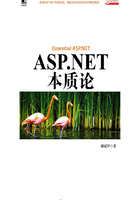
上QQ阅读APP看书,第一时间看更新
1.2.2 基于TcpListener的Web服务器
为了简化基于TCP协议的监听程序,.NET在System.Net.Sockets命名空间中提供了TcpListener类,使用它,在构造函数中传递一组网络端点信息就可以准备好监听参数,而不再需要设置使用的网络协议等细节,调用Start方法之后,监听工作就开始了。AcceptTcpClient方法将阻塞进程,直到一个客户端的连接到达监听器,这个方法将返回一个代表客户端连接的代理对象,它的类型为TCPClient,我们可以通过它与客户端进行通信。
在输入输出部分,通过TcpClient对象可以得到一个用于输入和输出的网络流对象NetworkStream,这是一个派生自Stream对象的字节流对象,对Socket的输入和输出进行了封装,这样,我们可以通过常用的字节流操作来完成网络的输入和输出,如下面的代码所示:
// 取得本机的 loopback 网络地址,即 127.0.0.1
IPAddress address = IPAddress.Loopback;
// 创建可以访问的端点,49152 表示端口号
IPEndPoint endPoint = new IPEndPoint(address, 49152);
// 创建 TCP 监听器
TcpListener newserver = new TcpListener(endPoint);
// 启动监听器
newserver.Start();
Console.WriteLine(" 开始监听...");
while (true)
{
// 等待客户端连接
TcpClient newclient = newserver.AcceptTcpClient();
Console.WriteLine(" 已经建立连接! ");
// 得到一个网络流
NetworkStream ns = newclient.GetStream();
// 处理过程中使用 UTF-8 编码
System.Text.Encoding utf8 = System.Text.Encoding.UTF8;
byte[]request = new byte[4096];
int length = ns.Read(request, 0, 4096);
string requestString = utf8.GetString(request, 0, length);
Console.WriteLine(requestString);
//状态行
string statusLine = "HTTP/1.1 200 OK\r\n";
byte[]statusLineBytes = utf8.GetBytes(statusLine);
// 准备发送到客户端的网页
string responseBody ="<html><head><title>From Socket
Server</title></head><body><h1>Hello, world. </h1></body></html> ";
byte[]responseBodyBytes = utf8.GetBytes(responseBody);
// 回应的头部
string responseHeader =
string.Format(
"Content-Type: text/html;
charset = UTF-8\r\nContent-Length:{0}\r\n",
responseBody.Length
);
byte[]responseHeaderBytes = utf8.GetBytes(responseHeader);
// 输出回应的状态行
ns.Write(statusLineBytes, 0, statusLineBytes.Length);
// 输出回应的头部
ns.Write(responseHeaderBytes, 0, responseHeaderBytes.Length);
// 输出回应头部与内容之间的空行
ns.Write(new byte[]{13, 10}, 0, 2);
// 输出内容部分
ns.Write(responseBodyBytes, 0, responseBodyBytes.Length);
// 关闭与客户端的连接
newclient.Close();
if (Console.KeyAvailable)
break;
}
// 关闭服务器
newserver.Stop();
程序的处理效果与使用Socket相同。